北师大版(2019)选择性必修第二册:Unit 4 Humour Reading Club2课件(21张ppt)
文档属性
| 名称 | 北师大版(2019)选择性必修第二册:Unit 4 Humour Reading Club2课件(21张ppt) | 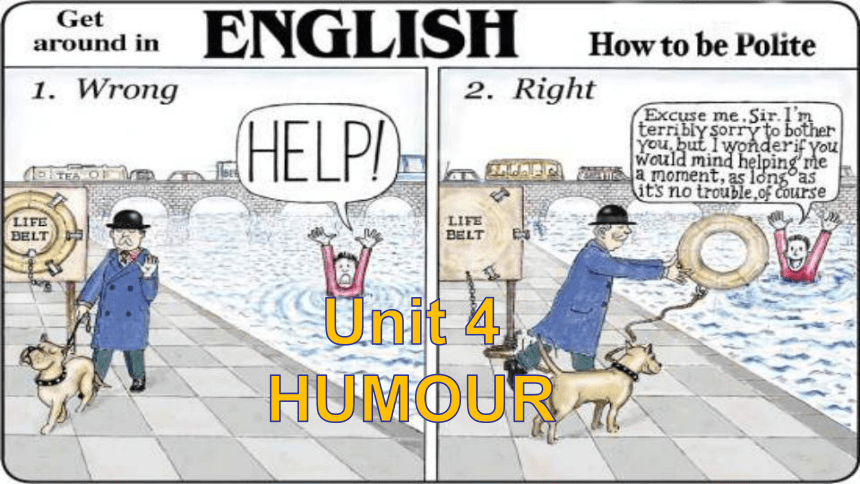 | |
| 格式 | pptx | ||
| 文件大小 | 1.7MB | ||
| 资源类型 | 教案 | ||
| 版本资源 | 北师大版(2019) | ||
| 科目 | 英语 | ||
| 更新时间 | 2022-01-05 13:17:18 | ||
图片预览

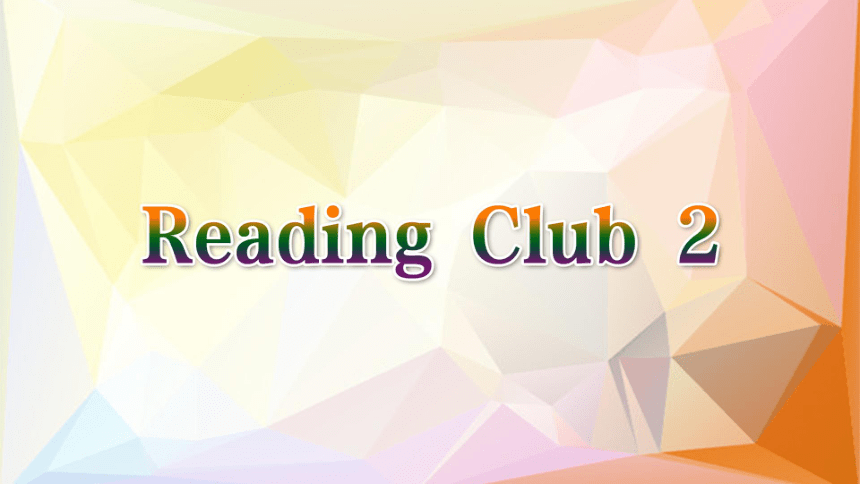
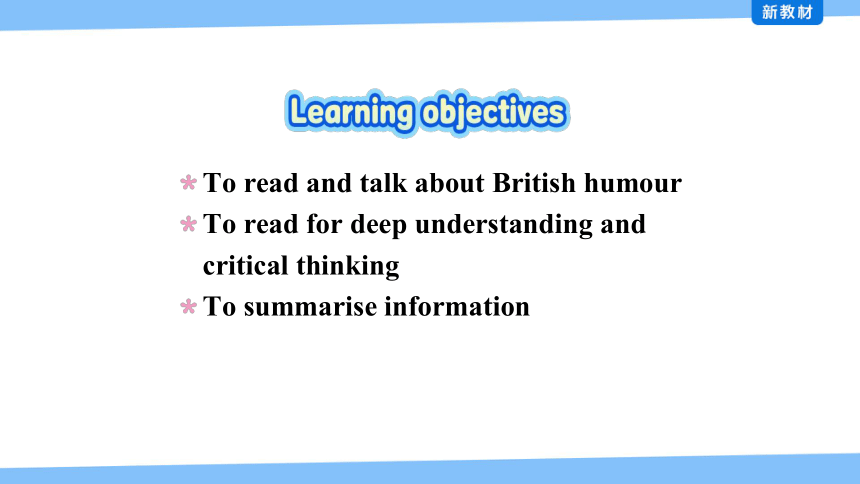
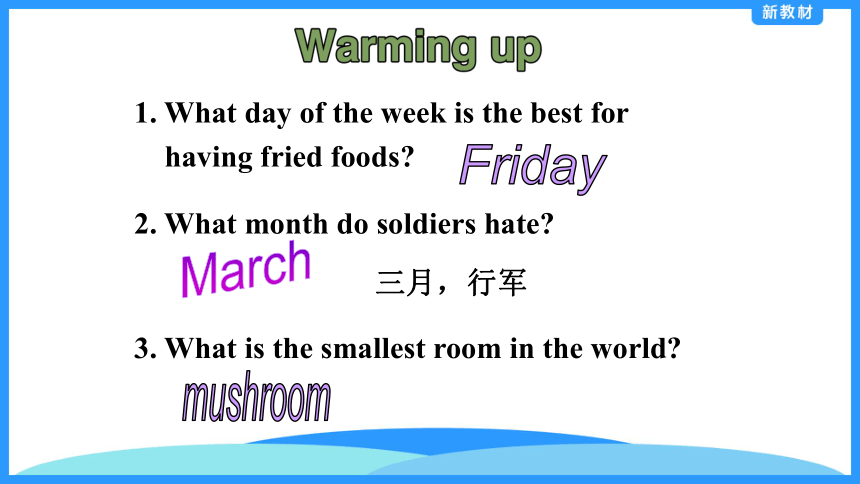
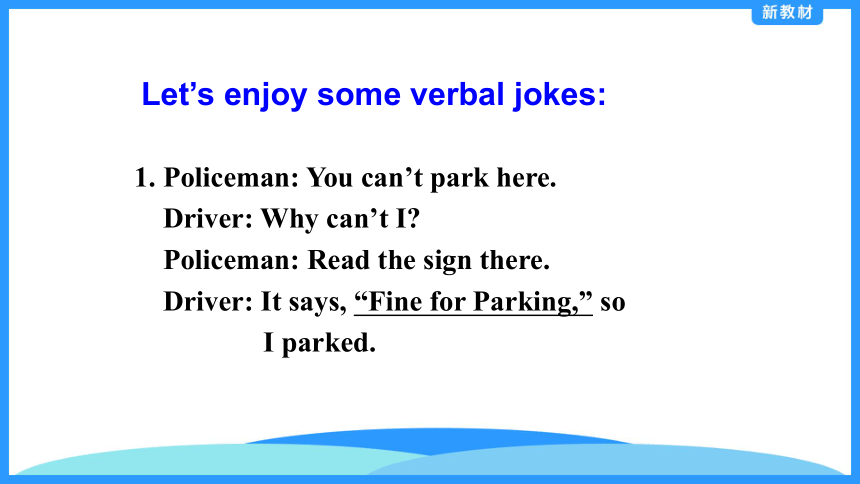
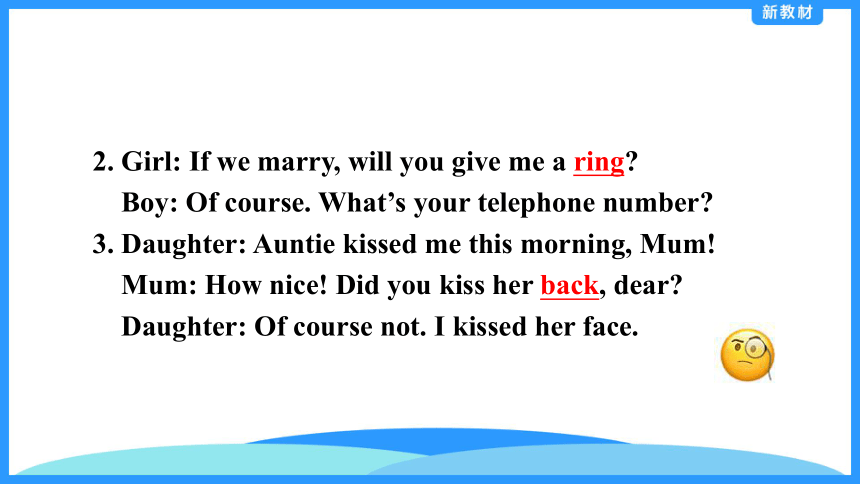
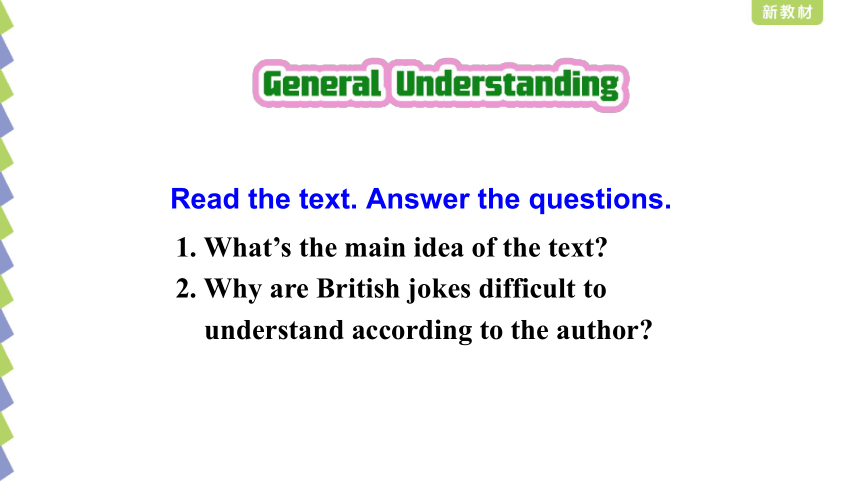
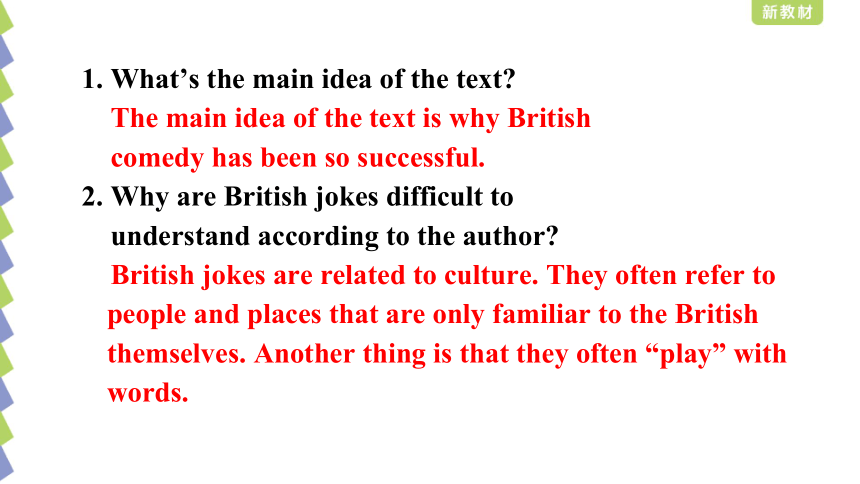
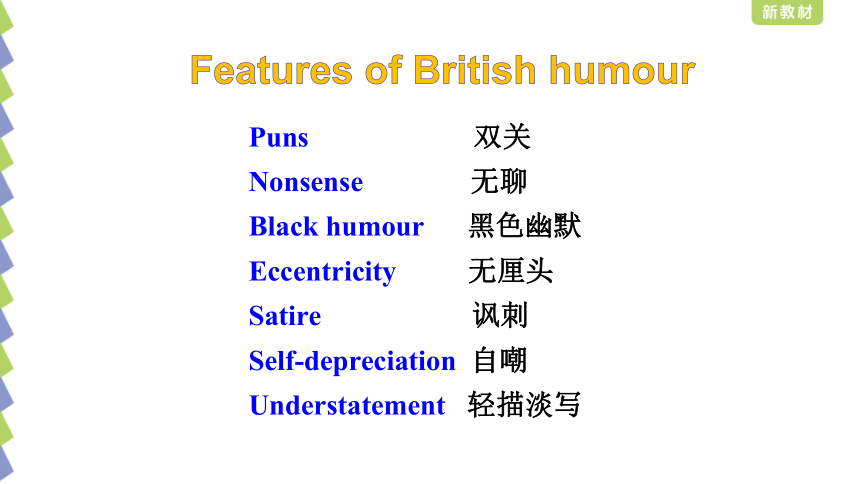
文档简介
(共20张PPT)
Unit 4
HUMOUR
To read and talk about British humour
To read for deep understanding and critical thinking
To summarise information
1. What day of the week is the best for
having fried foods
三月,行军
3. What is the smallest room in the world
Friday
March
2. What month do soldiers hate
mushroom
1. Policeman: You can’t park here.
Driver: Why can’t I
Policeman: Read the sign there.
Driver: It says, “Fine for Parking,” so
I parked.
Let’s enjoy some verbal jokes:
2. Girl: If we marry, will you give me a ring
Boy: Of course. What’s your telephone number
3. Daughter: Auntie kissed me this morning, Mum!
Mum: How nice! Did you kiss her back, dear
Daughter: Of course not. I kissed her face.
Read the text. Answer the questions.
1. What’s the main idea of the text
2. Why are British jokes difficult to
understand according to the author
1. What’s the main idea of the text
The main idea of the text is why British
comedy has been so successful.
2. Why are British jokes difficult to
understand according to the author
British jokes are related to culture. They often refer to
people and places that are only familiar to the British
themselves. Another thing is that they often “play” with
words.
Features of British humour
Puns 双关
Nonsense 无聊
Black humour 黑色幽默
Eccentricity 无厘头
Satire 讽刺
Self-depreciation 自嘲
Understatement 轻描淡写
The English appear to be a deeply serious people. This gives an added piquancy(辛辣, 刺激) to the English sense of humour. For it comes as a surprise to foreigners to find that it exists at all.
Work in groups. Enjoy more examples of British humour and discuss what makes them funny
Customer and waiter jokes:
1. C: What’s that fly doing in my soup
W: Swimming. I think!
2. C: What’s that
W: It’s bean soup.
C: I don’t want to know what it’s been. I want to know
what it is now.
3. C: Waiter. Will the pancakes be long
W: No, sir. Round.
“May I borrow your record player tonight ” a man asked his neighbour. “Sure. Do you want to listen to some music ”
“No,” he answered. “Tonight I want to have some peace and quiet.”
What are the characteristics of Chinese humour Are there any similarities and differences between Chinese humour and British humour Discuss with your partner.
Chinese humour is based on puns and the British use irony, sarcasm(讽刺,嘲讽), banter(打趣,逗乐), understatement, self-deprecation, teasing or mockery.
British and Chinese humour uses irony and sarcasm, however, for different purposes.
In China, the speaker and the listener are aware that the speaker is making fun of something and the speaker is trying to make the listener happy. Humour is usually used as a form of positive communication. The British can sound mean when they sense that the listener is not aware of the situation.
Another similarity is the use of irony, however, the British use more irony in their everyday language. The target of British irony and sarcasm is usually themselves
Chinese humour avoids joking about someone‘s personal life as it’s taboo. British humour has no limits.
Find more examples of British humour from the Internet or books.
Unit 4
HUMOUR
To read and talk about British humour
To read for deep understanding and critical thinking
To summarise information
1. What day of the week is the best for
having fried foods
三月,行军
3. What is the smallest room in the world
Friday
March
2. What month do soldiers hate
mushroom
1. Policeman: You can’t park here.
Driver: Why can’t I
Policeman: Read the sign there.
Driver: It says, “Fine for Parking,” so
I parked.
Let’s enjoy some verbal jokes:
2. Girl: If we marry, will you give me a ring
Boy: Of course. What’s your telephone number
3. Daughter: Auntie kissed me this morning, Mum!
Mum: How nice! Did you kiss her back, dear
Daughter: Of course not. I kissed her face.
Read the text. Answer the questions.
1. What’s the main idea of the text
2. Why are British jokes difficult to
understand according to the author
1. What’s the main idea of the text
The main idea of the text is why British
comedy has been so successful.
2. Why are British jokes difficult to
understand according to the author
British jokes are related to culture. They often refer to
people and places that are only familiar to the British
themselves. Another thing is that they often “play” with
words.
Features of British humour
Puns 双关
Nonsense 无聊
Black humour 黑色幽默
Eccentricity 无厘头
Satire 讽刺
Self-depreciation 自嘲
Understatement 轻描淡写
The English appear to be a deeply serious people. This gives an added piquancy(辛辣, 刺激) to the English sense of humour. For it comes as a surprise to foreigners to find that it exists at all.
Work in groups. Enjoy more examples of British humour and discuss what makes them funny
Customer and waiter jokes:
1. C: What’s that fly doing in my soup
W: Swimming. I think!
2. C: What’s that
W: It’s bean soup.
C: I don’t want to know what it’s been. I want to know
what it is now.
3. C: Waiter. Will the pancakes be long
W: No, sir. Round.
“May I borrow your record player tonight ” a man asked his neighbour. “Sure. Do you want to listen to some music ”
“No,” he answered. “Tonight I want to have some peace and quiet.”
What are the characteristics of Chinese humour Are there any similarities and differences between Chinese humour and British humour Discuss with your partner.
Chinese humour is based on puns and the British use irony, sarcasm(讽刺,嘲讽), banter(打趣,逗乐), understatement, self-deprecation, teasing or mockery.
British and Chinese humour uses irony and sarcasm, however, for different purposes.
In China, the speaker and the listener are aware that the speaker is making fun of something and the speaker is trying to make the listener happy. Humour is usually used as a form of positive communication. The British can sound mean when they sense that the listener is not aware of the situation.
Another similarity is the use of irony, however, the British use more irony in their everyday language. The target of British irony and sarcasm is usually themselves
Chinese humour avoids joking about someone‘s personal life as it’s taboo. British humour has no limits.
Find more examples of British humour from the Internet or books.
同课章节目录
- Unit 4 Humour
- Lesson 1 What’s So Funny?
- Lesson 2 Why Do We Need Humour?
- Lesson 3 My Favourite Comedian
- Unit 5 Education
- Lesson 1 Enlightening a Mind
- Lesson 2 The Objectives of Education
- Lesson 3 Understanding
- Unit 6 The Media
- Lesson 1 From Page to Screen
- Lesson 2 Questions about Media
- Lesson 3 The Advertising Game
